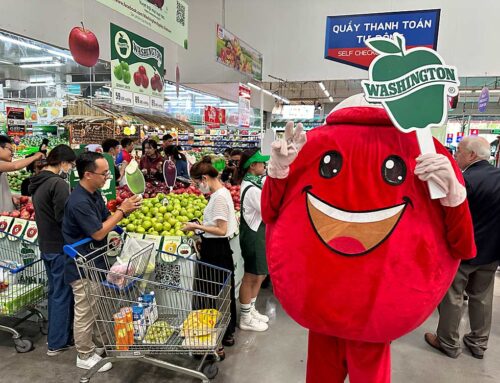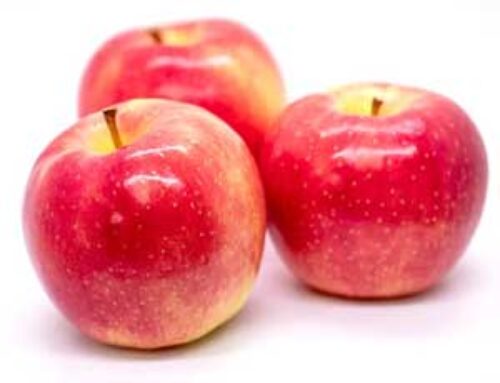
Paul Atwood and his father Myron received the 2009 Golden Delicious award from Stemilt Growers Inc. Atwood Orchards joined Stemilt in 1966
It’s not unusual to hear melodic strains of Broadway show tunes over the bass of a tractor at Atwood Orchards at Wenatchee, Washington.
For Paul Atwood, who runs the 58-acre orchard with his father, Myron, is probably better known in north central Washington as an actor and singer than as a farmer. When he’s out working in the orchard, he’s often rehearsing lines from flash cards or singing his part. This fall, during harvest, he could be heard practicing the high notes in a barber’s song for Music Theater of Wenatchee’s production of “Sweeney Todd.”
Paul, 42, is the fifth generation of Atwoods at the orchard, which was established in 1908 by his great-grandfather Paul in partnership with his great-great-grandfather Myron, who was a businessman in Illinois.
Paul’s father (also called Myron) and his grandfather Chuck never considered doing anything but being orchardists. “That’s what they wanted to do in life, and they couldn’t help but get up and go out there in the morning,” said Paul.
But for Paul, it was different. He sang in high school, and when he was a senior, in 1986, he landed his first theater part as the comic gambler Nicely-Nicely Johnson in a school production of “Guys and Dolls.” When he got his first laugh, he was hooked. He went to Washington State University on a vocal scholarship and earned a degree in liberal arts and a minor in theater. After graduating, he and his future wife Kelly, who earned a degree in vocal performance at WSU, went to Seattle to seek their fortunes on stage.
After six months of menial day jobs to make ends meet and being offered no stage parts, they had to reconsider. “I got discouraged fast, and I didn’t like the big city,” Paul said. “It was major culture shock. I couldn’t take it.”
He figured if they could stay for ten years or so, and handle the rejections, they would eventually get some roles. But they were ready to marry and have a family, which didn’t fit well with their acting aspirations. “You have to live like a Bohemian,” Paul said. “If that’s your life, you really have to dedicate your whole life to that.”
So, they returned to Wenatchee and the family orchard, and both Paul and Kelly soon became successful in the local theater scene. “Not only was I accepted by my family as a partner, but also I was getting roles,” Paul said.
Drama
At first, the gigs came without pay. He began to direct as well as act and in 2001 got a part-time paid position with the Wenatchee School District as drama advisor and director of the district musicals. Last fall, along with harvesting apples and pears, he directed “The King and I” with a cast of 177 students; this fall, he’s directing “Oklahoma.”
Myron said he might have stifled Paul’s interest in theater at first but now accepts that it’s his son’s first love. During harvest, they start work at daybreak and end midafternoon, allowing Paul to go to the theater afterwards.
The orchard comprises just under 20 acres each of apples, pears, and cherries. They have Red Delicious, Golden Delicious, Fuji, Granny Smith, and Gala apples; Bing, Lapins, Sweetheart, and Skeena cherries; and Bartlett, d’Anjou, and Golden Russet Bosc pears.
Award
Last summer, they received the 2009 Golden Delicious Award from Stemilt Growers Inc. for the high quality of their fruit.
“It feels good,” Myron said. “You work all year and you never know, with Mother Nature, what you’re going to have, and it’s nice to be recognized by Stemilt—which is one of the largest sheds in the world now—that you’re one of their better growers for that year.”
Some of their Golden Delicious trees are 40 years old, but still productive. For the last two years, the Goldens have produced 110 bins per acre. The Golden deal is up one year and down the next, Myron said, but they kept their Goldens because many other people have taken theirs out over the past decade.
When Atwood Orchards joined Stemilt in the 1960s, it was the packing company’s largest apple grower with 40 acres, Myron said. At the time, Stemilt was primarily a cherry packer.
Today, Stemilt handles apples from thousands of acres, and Atwood Orchards has fewer apples. “Now, we’re probably one of the smallest growers,” Myron said.
Crusader
They feel that diversification is the key to continued success, though having the cash flow to replant is a challenge for a small grower.
“We’re a dying breed,” said Myron, who has seen several of his friends lose their orchards. “Being so versatile is keeping us surviving.”
The Atwoods hire crews to help with pruning, thinning, and picking but try to do all the rest of the work themselves. Kelly hauls the fruit to the warehouse and does the payroll, and has a part-time job making soft furnishings for a couple of Wenatchee businesses.
Myron, 65, is gradually letting go of the reins, and Paul said he feels it’s important to keep the orchard in business in the hope that it can continue to the sixth generation. “Something that was instilled in me from a very early age is the sense of tradition,” he said.
All of Paul’s three children, Alexandra (16), Madeline (14), and Mason (10) like orchard work, and help out during cherry harvest. They’re also interested in the theater, to which they were introduced at a young age.
Now that he’s been able to participate so much in the theater, Paul doesn’t mind saying no to some opportunities that come along, because he knows that the orchard is his bread and butter. However, he won’t ever turn down a high-school production because the school no longer offers drama classes during school hours and he feels the opportunity to be involved in theater is important to young people. It helps students build confidence and relate to adults, and it gives them a sense of community and belonging, he said.
“The arts played an important part in my life and the world in general, and that’s what’s lacking these days. If I have to be a crusader, then so be it.”
He feels fortunate to be able to do that and at the same time produce healthy food at the orchard.
“I have the best of both worlds,” he said. “I can be on a tractor during the day and play theater at night. Here I am growing things for people and then also making people laugh, cry, and think about everyday life. What could be better?”






Leave A Comment